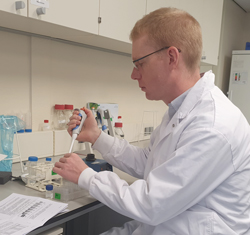
Owen Swift heads Swift Scientific, LLC, Coventry, Connecticut. The one-man agency represents premium manufacturers of scientific laboratory equipment, reagents and biologics.
A drive to build a solid foundation for a career as an independent manufacturers’ rep coupled with an entrepreneurial spirit pointed Owen Swift in the direction of opening his own agency in 2017. Today, Swift heads Swift Scientific, LLC, Coventry, Connecticut. His one-man agency represents premium manufacturers of scientific laboratory equipment, reagents, and biologics and matches unique research and development technologies with specific lab applications.
Swift’s career background includes more than 15 years providing automation equipment and specialized consumable supplies to life-science researchers in the Northeast United States. His experience spans the drug development pipeline from discovery and basic research through to manufacturing. He has worked with some of the most prominent pharmaceutical companies and university medical centers to advance their research through better technology.
As he recalls the path he paved to becoming a rep, Swift explains, “I started my career as a direct factory salesman. From the beginning I always knew what reps were and the possibility to have my own agency was always there for me in the background. In the vertical industry of biology research that I work in, it’s amazing that reps tend to be clustered around raw materials and manufacturing technology, that is, the materials in machines that produce drug products. My career was based in research and development technology. Naturally, I was familiar with the needs of customers and trying to figure out who to target and how they were going to choose drugs to fit those targets. The market is filled with diverse customer needs.”
He continues, “As a factory-direct salesman, I always liked working with the smaller companies with novel technologies. The tricky part to that, however, is that it’s hard to have a steady career that way. I started as a direct employee rep, and typically for anyone, there’s usually a couple of things that will happen. The company does well, succeeds, grows, and ultimately gets acquired by someone else. Or, on the other hand, they don’t do well, they turn over their entire sales force or just liquidate the entire operation. Both of those scenarios make it hard to stay with a company for more than a handful of years. Your option is to leave after a couple of years and start all over with a new company with an entirely new pool of customers. And, you’re faced with the task of establishing entirely new relationships.”
Working With Novel Techs
Two years before he opened the doors to Swift Scientific, “I had it in my head that was what I wanted to do — go the independent rep route. I felt I could represent a handful of novel tech companies.”
When he made that decision, Swift was 37, married with two children and another on the way. Was he nervous making that kind of a move? “No, not really. I had been involved with start-up efforts before and was well equipped with an entrepreneurial mindset. I knew what the financial risks were, and I calculated those risks and set objectives for myself including establishing a time period that it would take me to reach a certain level of cash flow. I admit that it was a harder process than I thought, but I don’t think there was a point when I ever doubted myself.”
As with any agency start-up, one of Swift’s first tasks was to attract principals to fill out his line card. As he explains his process, “It used to be that half of my principals came from industry trade shows. I would attend a show and simply go booth to booth. Given that there would be about 300 principals in attendance, I could fill up a line card in a day.
“It’s interesting that there are fewer reps that sell in the research phase of the drug pipeline that I’m in. Add to that, you have all these small manufacturers that can’t afford to hire a salesperson. Another dynamic to consider is that many of these companies have been founded by tech people. Typically, they’re entrepreneurs, but usually they don’t have an experienced salesperson under their roof.
“It’s really not all that difficult to go booth to booth. Initially when I speak with a prospective principal, they think I’m just someone who’s looking for a job. But, give me about five minutes with them and I can explain how I work, and go into detail about the rep business model — you don’t pay me until I succeed. Most of them don’t really have an idea of how that works.”
Manufacturers’ Need
With just a little more than four years under his belt as an independent rep, Swift notes that if he’s encountered any surprises as a rep it’s been that “It’s incredible how many principals there are out there who have a need for what I do. Once I get their attention, they really don’t need a whole lot of convincing that having a working relationship with a rep can really benefit them.”

Undergoing sales training with one of his principals in The Netherlands, Swift remains enthusiastic about representing international manufacturers that have embraced the rep business model in the United States.
While many of the prospective principals that he speaks with aren’t all that familiar with how reps work, there are a few that get it from the start. For instance, “I had one company where they had a sales manager who was familiar with managing reps. He remains one of my best principals. From the beginning, he knew the level of support and the incentives needed to maintain a successful relationship with reps.
“With others who may not have the same level of experience, your relationship can be a bit of a double-edged sword. On the one hand, I could feel free to design the relationship; but, on the other hand, I then had to take responsibility to ensure that they would discuss all the pertinent issues and include me on sales calls. What it all comes down to is that establishing a lasting working relationship with some principals is easier with some than with others. If manufacturers express a willingness to have a close relationship, then the process is easier. With the others, your relationship is almost transactional. You won’t hear much about training — if you want training, you’re going to have to push for it and let them know exactly what it is that you need. Basically, they just want to hear about orders.”
Continuing on the subject of letting the principal know what the rep needs, Swift explains that he employs an on-boarding checklist to accomplish that goal. “Basically, what I have is a sales presentation that I present to principals. It’s something that I record, and it serves as a helpful starting point for the relationship.”
Included in that on-boarding checklist is information on:
- Level of support — “The biggest concern here is navigating potential tension that can develop over who is responsible for generating leads. From the start, I let a principal know that I will do all that I can to support their marketing programs — but I will not be responsible for generating leads. That’s their job.”
- Payments (including advances) — “Many manufacturers don’t necessarily understand what it takes to develop business in the territory. In addition, I can recall one early principal I was working with that wanted to carve out huge portions of my territory as house accounts. Their feeling was that they didn’t want to pay me commissions on business they were already taking in. My response to that is you have to be willing to negotiate.”
Then there’s the subject of shared territorial development fees — or as Swift refers to them “an advance.”
“When we talk about an advance on commissions in lieu of a fee, I’m quick to let the principal know that that’s something he’s going to earn back. Initially I was reluctant to raise this subject. My feeling was that I didn’t want to approach that line and since the manufacturer had no business, they wouldn’t be willing to hang on to me. Since then, however, the demand for my services has been so great that I’ve been much more aggressive when it comes to advances. I’ll propose something that lasts about three months. After that period of time, I have a real understanding of both the manufacturers’ and the customers’ needs, and I’m confident that we can continue the relationship.”
- The rep’s value — “Fortunately I deal with a number of ‘young’ companies and their people seem to have an understanding of the challenges accompanying bringing a product to market. Many of them are funded by equity groups and they understand the concept of demonstrating value to their stakeholders. I feel that when I have a conversation about the value that I bring to their efforts, it’s an easier conversation than I have to have with many other people.”
About half of the principals that Swift works with are international, including companies from Korea, Japan, Germany, Spain, Switzerland and The Netherlands. He voices enthusiasm for working with those companies when he says, “There are certainly challenges working with those companies, but at the same time, you get a cross-cultural boost that brightens your day. When you get on a conference call with someone from a different country, it’s actually exciting. Among the challenges are those of language, transportation, and some quality concerns, but in general it’s very rewarding.”
Importance of Leads
When he’s asked based on his experience with working with principals who may not be all that familiar with the rep business model if there’s anything he’d like manufacturers to be more understanding or appreciative of when it comes to their reps, Swift quickly points to the subject of lead generation: “I don’t think anyone truly understands how difficult it can be. There’s much more to it than just contacting a friend for a referral or making calls and sending emails. Let’s say I just developed a lead and emailed the manufacturer about that success. Too often their response is ‘That’s great….’ and not much else. There’s not necessarily the understanding of how much research and work I did to develop that lead. Prospecting for good leads can be a real grind. If anything, I’d wish a manufacturer could have the opportunity to spend a week or two with me generating leads by hand. Maybe then, they’d have more of an appreciation for the type of work that their reps willingly soak up on their behalf.”
According to Swift, of assistance to him and his agency has been his membership in MANA. “About a week before I opened my doors, I was busy conducting research about opening and running an agency and writing a business plan. I was going it alone and really didn’t have any mentors to help me. At the time I knew one other rep but I wasn’t anxious to emulate what he had done. I kept on looking for information on how to write a business plan and for articles on what reps charged. Those questions eventually led me to MANA, and I was able to see the value of membership immediately. It provided me with all the nuts and bolts of information about setting up and running an agency.”
MANA welcomes your comments on this article. Write to us at [email protected].

